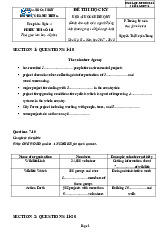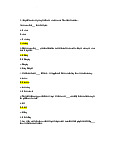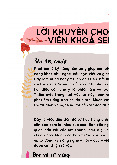


















Preview text:
Supplementary Materials for Speaking 1 (SM)- For Students
SPEAK ENGLISH NATURALLY 1 (Pre - intermediate)
LIST OF ABBREVIATIONS................................................................. ...........................1
INTRODUCTION............................................................................................................ ...2
CHAPTER 1: KNOWLEDGE OVERVIEW AND PRACTICE EXERCISES…….. 3
A. OBJECTIVE ................................................................................................................. 3
B. KNOWLEDGE OVERVIEW AND PRACTICE EXERCISES.....................................3
UNIT 1: LIFE – Nice day, isn’t it?.............................................................. ........................4
UNIT 2: WORK – I like working.............................................................. ........................11
UNIT 3: TIME OUT – Can I take a message............................................... ................... 19
UNIT 4: GREAT MINDS – What should I do................................................ ..................29
UNIT 5: TRAVEL – You can’t miss it..............................................................................38
UNIT 6: FITNESS – How are you feeling............................................................ ............49
UNIT 7: CHANGES – Can you tell me?............................................................... ...........60
UNIT 8: MONEY – I’m just looking......................................................................... .......70
UNIT 9: NATURE – It could be because.................................................................. ........80
UNIT 10: SOCIETY – There is a problem..................................................................... ...90
UNIT 11: TECHNOLOGY – I totally disagree.................................................................98
UNIT 12: FAME – What can I do for you................................................................... ...107 CHAPTER 2: ORAL EXAMINATION STRUCTURE, TEST-TAKING
STRATEGIES AND ILLUSTRATION EXERCISES………………………… .......115
A. OBJECTIVE...................................................................................... .........................115
B. EXAMINATION STRUCTURE AND TEST TAKING STRATEGIES........... ...... 115
CHAPTER 3: PRACTICE TESTS.................................................... .........................127
A.OBJECTIVE…………………………………………….……………….......……....127
B. PRACTICE TESTS……………………………………………………….………....127
ANSWER KEYS............................................................................................................138
REFERENCES...............................................................................................................172
SPEAK ENGLISH NATURALLY 1 (Pre - intermediate) LIST OF ABBREVIATIONS No. Abbreviation Meaning 1 Adj Adjective 2 Adv Adverb 3 Exp Expression 4 V, V Verb 5 N Noun 6 Prep Preposition 7 phr v phrasal verb 8 S Subject 9 O Object Page 1
SPEAK ENGLISH NATURALLY (Pre-intermediate) INTRODUCTION To the students,
Speak English naturally 1 is designed to serve for teaching and studying of
teachers and students whose major is English Language of the University of Economics
- Technology for Industries (UNETI). This supplementary book gives an overview of
speaking skill for freshmen. From learnt knowledge, students will have well English
reaction, natural speaking, right intonation and stress. This studying material compiled
in line with the main textbook “SPEAKOUT - PREINTERMEDIATE” for English
Language major was ratified by UNETI and English Faculty council. Th e
supplementary book is designed clearly, scientifically to both teachers and students with 3 chapters.
Chapter 1: Knowledge Overview and Practice Exercises
This chapter emphasizes on knowledge overview of every single Unit of
“SPEAKOUT PRE-INTERMEDIATE’’ textbook and practice Exercises.
Chapter 2: Oral examination structure, test-taking strategies and illustration Exercises.
The chapter provides the examinations structure, the different task types so
candidates know what to expect when taking the exam and strategies in order to help
students more confident in oral examination level 2/6 (A2) basing on Vietnamese
standardized Test of English Proficiency (Vstep).
Chapter 3: Practice Tests
This chapter is functionally presented with practice tests with the aim of helping
students well prepare for the final examination.
“Speak English naturally 1” will be an effective supplementary book for practice
in order to improve speaking skill and help students speak fluently, know how to use
right English style, intonation and stress…. in communicating with foreigners.
Although there have been many attempts at compiling, this supplementary book
has inevitable omission. We would be grateful to welcome the constructive suggestions
and recommendations to improve the book in the next edition.
Please send all the responses to: vthvan@uneti.edu.vn Thank you!
Vu, T.H.V, Pham, H.N, Le, T.T. (2020) Page 2
SPEAK ENGLISH NATURALLY 1 (Pre - intermediate) CHAPTER 1:
KNOWLEDGE OVERVIEW AND PRACTICE EXERCISES A. Objective:
- Overview and consolidate learnt knowledge.
- Skillfully apply the knowledge of vocabulary, structure, pronunciation and stress
in the spoken part level 2/6 (A2).
B. Knowledge Overview and Practice Exercises.
All learnt knowledge in the textbook “SPEAKOUT PRE-INTERMEDIATE” will
be overviewed in this chapter. Students will be systematically revised all knowledge of
Vocabulary, Function, Learn to, Pronunciation and Speaking in each Unit. Besides,
with the various types of practice Exercises, students will practise more cautiously to
have a thorough grasp of knowledge, know how to solve the practical situations in
order to improve speaking skill. Page 3
Unit 1: Nice day, isn't it? LIFE UNIT 1
1.3. Nice day, isn’t it? A. OBJECTIVES
After this part, students will be able to:
• Use some vocabularies about to make conversation.
• Use expressions to practice way of making conversation.
• Know how to listen to conversation and choose which one is better through linking words.
• Study linking help Students’ speaking sound more naturally. B. OVERVIEW 1 2 3 VOCABULARY FUNCTION LEARN TO Conversation topics Making conversation Sound natural 5 4 PRONUNCIATION SPEAKING Linking word
How to make a good conversation I. VOCABULARY CONVERSATION TOPICS Page 4
Unit 1: Nice day, isn't it? No Words Pronunciation Meanings and examples 1 conversation /,kɔnvə’seiʃn/
Talk between two or more people in (n)
which thoughts, feelings, and ideas are
expressed, questions are asked and
answered, or news and information is exchanged.
I had an interesting conversation with Alice yesterday. 2 interrupt (v) /intə’rʌpt/
To stop a person from speaking for a
short period by something you say or do.
I tried to explain, but people kept interrupting me. 3 gossip (n) / ‘gɒsəp/
Conversation or reports about other
people’s private lives that might be
unkind, disapproving, or not true.
I heard some gossip about Mary, but I don’t believe it. 4 rude (adj) /ru:d/
Not polite, offensive or embarrassing. He is a very rude man. 5 response (n) /ri’spɒns/ An answer or reaction.
I looked in her face for some response,
but she just stared at me blankly. 6 conversation /,kɔnvə’seiʃn/
A line or phrase that is either killer (n) /‘kɪlər/
purposely used to end a conversation
with someone as soon as possible, or a
comment that unwittingly ends a conversation.
If you are a conversation killer, you
usually make the conversation die down. 7 watch out (v) /wɔtʃ/ /aut/
Used to warn someone of danger or an
accident that seems likely to happen.
Watch out! It’s rather wet over there. PRACTICE Page 5
Unit 1: Nice day, isn't it?
Ex 1. Underline the correct alternatives
1. I’m very bad at saying/telling jokes. No one ever laughs!
2. Please don’t say/interrupt me, I haven’t finished.
3. Try not to talk about/say too many negative topics.
4. Maria said/gossiped that she was hungry .
5. He’s really easy to talk to, we had/did a great conversation.
6. What did you talk to/ about all evening?
Ex 2: Complete the sentences with the words in the box. Use one word twice
have tell interrupt say gossip
1. We often………….interesting conversations in our English class.
2. You shouldn’t ………… so much about people at work. It’s not nice.
3. You look sad. Shall I………..you a joke?
4. What did your mum……… when you got home late last night?
5. So, Judy. …….me about your new job.
6. What did you……….about with your sister last night?
7. Why do you always…………me when I’m in the middle of a story? I hate that! II. FUNCTION MAKING CONVERSATION Making conversation Response This is my friend (name)
Hi (name). Pleased to meet you Would you like a drink?
I’d love a coffee, thank you Nice day, isn’t it Yes, It’s lovely
Where exactly do you come from? I come from…., near So, do you work here? No, I’m a student Did you have a good weekend?
Yes, it was OK. I didn’t do much
Did you watch the match last night? Yes, it was terrible We lost 3-0
Oh, no! I’m sorry to hear that I’ll see you later See you soon PRACTICE Page 6
Unit 1: Nice day, isn't it?
Ex 1: Find and correct the mistakes. There is a mistake or missing word in each sentence. 1. This is the friend, Sara 2. Hi. Pleased to know you 3. Do you like a drink?
4. Where exactly are you come from? 5. Did you have good weekend? 6. I see you later
Ex 2: Put the words in the correct order to make sentences 1. meet / to / you / pleased
2. coffee / would / I / a / love 3. do / what / so / you / do?
4. I / you / see / ‘ll / later
5. come / where / do / from / exactly / you? 6. soon / see / you III. LEARN TO SOUND NATURAL
1. Use so to help a conversation when you ask another question and make it sound natural
Ex: Poland? So where exactly in Poland do you come from?
2. You can also use it when you want to change the topic.
Ex: So, did you watch the match last night? PRACTICE
Ex 1: Add so to the questions in the right place in the conversation to make it sound natural
W: Hi, Davide. This is my friend, Rachel.
D: Hi, Rachel. Pleased to meet you. Would you like a drink? R: Sorry. What did you say?
D: Would you like a drink, Rachel?
R: Oh. I’d love a coffee, thank you D: Do you work here? R: No, I’m a student Page 7
Unit 1: Nice day, isn't it?
D: Are you here on holiday then? R: Er….yes.
D: Where exactly do you come from?
R: I’m from Beckley, near Oxford.
D: OK, er, I’ll just go and get the coffee. IV. PRONUNCIATION LINKING WORD
Word linking: Word linking or connected speech is how we join the words together to
speak FASTER, MORE NATURALLY and MORE FLUENTLY. If English is not
your mother tongue, you are probably not doing word linking. If you do not join the
words together when you speak, you can’t follow native speakers’ speed and THEY
can’t follow your line of thought. Native speakers (not only of English) process the
language in big chunks and could lose concentration when the sentence sounds broken or incoherent.
In order to produce a stream of English sounds, you must understand and apply 3 speech patterns as follows:
- Linking consonant to vowel (CTV)
- Linking consonant to consonant (CTC)
- Linking vowel to vowel (VTV) spacer PRACTICE
Ex 1: ▷T.1.1. Read the pronunciation tip. Then listen and repeat the questions
1. What did you do last night? 2. Did you watch the match? 3. Would you like a coffee?
4. What would you like to drink? 5. Do you have the time? 6. Where do you live?
Ex 2: ▷T.1.2. Listen to the questions and circle the phrases you hear 1. Do you Did you Would you 2. Do you Did you Would you 3. Do you Did you Would you 4. Do you Did you Would you Page 8
Unit 1: Nice day, isn't it? 5. Do you Did you Would you 6. Do you Did you Would you V. SPEAKING
Choose one of the topics in the box below to make the conversation
Last holiday fashion part time job family weather study films C. UNIT PRACTICE
Ex 1: Choose the best answer and record your speech
1. A: I’ll pick you up at 8 o’clock on my way to the airport B: ……………….. A. For pleasure B. Great. I’ll see you then C. I have a phone D. Would be
2. A: Would you like to join us on the trip to La Khe Silk Village? B: …………… A. Sounds great B. For now C. Better things happened D. I don’t think s o
3. “Thanks for giving me a ride to work today.”
“……………I was heading this direction any way” A. You don’t need to B. Yes, thanks C. No worries D. Sound great
4. “…………..?” “Everything is fine. How about you?” A. How old are you B. How’s i t going? C. What is your life? D. What’s the matter?
5. My life’s got stuck these days. I am so depressed and unable to think of anything” “…………..” A. You will be tired B. Stay stuck there
C. Stay calm. Everything will be alright D. No, thanks
6. “Mom, I’ve got the first rank in class this semester!” “…………” A. Well done! B. Thank you! C. Never mind! D. Let’s go
7. A. “Would you like a drink?” Page 9
Unit 1: Nice day, isn't it? B. ……………… A. I like a drink B. No, I don’t like
C. I’d love a coffee, thank you
D. I prefer orange juice to lemon juice 8. A: Nice day, isn’t it? B: …………….. A. It’s very kind B. I like rainy C. No, thanks D. It’s lovely
9. A: You really must go to Hoi An to enjoy the full moon at Mid-autumn Festival B:…………..
A. Yes, that’s what I’ve heard
B. Do you really know about it? C. Yes, I won’t go there D. No, thank you
10. A: This is my friend, Laura
B: Hi, Laura. …………………. A. Pleased to meet you B. Nice meeting you C . Please meet you D. Nice to meeting you
Ex 2: Situations - Make Conversation and record your speech.
1. You feel very tired after a working week. Make a conversation about inviting
your friend to go somewhere this weekend.
2. You are new students. Make a conversation with your classmate to introduce
yourself and ask your classmate about your class’s study.
Ex3: Suggested link for practice. Listen and record your speech.
https://youtu.be/m1-Bx3h4cio
https://youtu.be/4N9Y47aVTHM Page 10 Unit 2: Work WORK UNIT 2
2.3. I like working outside A. OBJECTIVES
After this part, students will be able to:
• Use some vocabularies on types of work to talk about the future job
• Practise ways of expressing likes/dislikes about work
• Know how to respond to what people say and ask more questions in order to sound interested B. OVERVIEW 2 1 3 FUNCTION VOCABULARY LEARN TO Expressing likes/dislikes Types of work Respond and ask more questions 4 5 PRONUNCIATION SPEAKING Sentence Stress
Talk about the job in the future I. VOCABULARY TYPES OF WORK Page 11 Unit 2: Work No Words Pronunciation Meanings and examples 1 industry (n) /indəstri/
The companies and activities involved
in the process of producing goods for
sale, especially in a factory or special area.
Most of these men work in the tourist industry. 2 account (n) /ə’kаʊnt/
An arrangement with a bank to keep
your money there and to allow you to
take it out when you need to.
Their annual accounts showed a loss of £4 million. 3 retail (n) / ‘ri:teɪl/
The activity of selling goods to the
public, usually in shops.
I’d really like to get a job in retail. 4 absolutely /æbsəlu:tli/
Used for adding force to a strong (adv)
adjective that is not usually used with
“very” or to a verb expressing strong emotion.
The food was absolutely delicious. 5 keen on (adj) /ki:n/ /on/
Very interested, eager or wanting to
do something very much.
She is keen on sailing. 6 marketing (n) / ‘ma:kitiŋ/
The job of deciding how to advertise and sell a product.
Stella works in marketing. 7 colleagues (n) /‘kɒli:g/
One of group of people who work together.
He always got along well with his
colleagues in the university. 8 biologist (n) /baɪ’ɒl.ə.dƷɪst/
A scientist who studies biology.
My best friend is a biologist. Page 12 Unit 2: Work 9 marine (adj) /mə’ri:n/
Related to the sea or sea transport.
The oil slick seriously threatens marine
life around the islands. 10 practical (adj) / ‘præktɪkəl/
Relating to experience, real situations,
or actions rather than ideas or imagination. The service offers young people
practical advice on finding a job. 11 under / ‘ʌndə/ ‘preʃə/
To be in difficult situation. pressure (n)
He doesn't work well under pressure. 12 suit (v) /su:t/
To be appropriate or suitable.
The city lifestyle seems to suit her – she looks great. PRACTICE
Ex 1: Match the jobs 1-8 with the types of work a-h 1. Chef a. Education 2. Sales assistant b. The fashion industry 3. Fashion designer c. Retail 4. Accountant d. Sales and marketing 5. TV presenter e. The tourist industry 6. Travel agent f. Accounts 7. Teacher g. The entertainment industry 8. Sales rep h. The food industry
Ex 2: Underline the correct alternatives
1. I don’t mind/think working late if I get time off late in the week
2. I don’t get much money from my job, but I do get long/big holidays
3. I am quite keen in/on working in the tourist industry
4. My boss lets me work long/flexible hours, so I can pick the children up from school
5. I very/absolutely love fashion
6. I am very motivated by interesting/flexible tasks Page 13 Unit 2: Work
7. Rescue workers often spend/save people’s lives
8. I can’t/don’t stand getting up early II. FUNCTION
EXPRESSING LIKES/DISLIKES
There are a number of verbs and other phrases to show likes and dislikes. After these
verbs and phrases, we usually use the –ing form Positive Negative I like singing/meat
I can’t stand smokin / g computers
I absolutely love swimming/tennis
I don’t like working/rock music
I’m keen on running/beach I hate watchin g T.V/films holidays
I’m not very keen on working/fruit
Note: We can also use like + infinitive
Note: I don’t mind means ‘ It’s OK for me.
Like + infinitive means “do as a habit I don’t like it or dislike it. Or “choose to do”
I don’t mind sleeping on the floor
I like to go to bed early PRACTICE
Ex 1: Complete the sentences with one word
1. I like……………..to music while I study. It helps me concentrate
2. I………mind getting up early for my job. It’s no problem for me
3. Stefania is keen……..travelling so she’s studying tourism
4. Mick……….like talking to customers. He says it’s boring
5. Lorenzo absolutely………dancing. He’s really good at samba
6. I can’t …….working at the weekend
Ex 2: Put the words in the correct order to make sentences
1. do / working / in / you / like / team / a?
2. working / under / pressure / can’t / stand / I
3. my / on / not / I’m / keen / boss / very
4. don’t / like / my / colleagues / I
5. mind / dealing / don’t / customers / I / with
6. keen / on / you /sport / are? Page 14 Unit 2: Work III. LEARN TO
RESPOND AND ASK MORE QUESTIONS Comments
Right I see That’s great It sounds wonderful Questions And what about Really? PRACTICE
Ex 1: Complete the words in the box in the conversations.
Interesting What really right see great Conversation 1:
A: On Saturday I went to a conference about the Z-phone, this amazing new technology
B: (1)…………….? I read about the last week. It sounds (2)……………
A: Well, everybody is talking about it
B: And (3)………..about the cost?
A: Oh, I don’t know. I had to leave before they discussed that. Conversation 2:
A: Today I was offered a job as a babysitter B: That’s (4)………..
A: Not really. They only offered me five pounds an hour
B: Oh, I (5)………. So did you accept the job?
A: No, I’m going to look for something better.
B: (6)…………. What did you tell them?
A: I said, “Dad, I know the baby is my sister, but I want a better salary IV. PRONUNCIATION SENTENCE STRESS
What is sentence stress?
Words in a sentence are not all given the same salience in oral English. Some words are
picked out and are stressed in contrast to others. The one that is the most stressed is
said to receive the sentence stress. This usually implies differences in meaning. In the Page 15 Unit 2: Work
following sentences, the sentence stress is indicated in bold case. Consider the
difference in meaning for each of these scenarios. Sentence Stress illustrated: Sentences Meaning
1. I don’t think she would write it
I don’t think that, but someone else does
2. I DON’T think she will listen to him
It is not true that I think that
3.I don’t THINK she will listen to him
I don’t think that, I know that. Or: I don’t
think that, but I could be wrong
4. I don’t think SHE will listen to him
I think that someone other than her will listen to him
5. I don’t think she WILL listen to him
I think that she is not willing or agreeable to listening to him.
6. I don’t think she will LISTEN to him Instead of listening, she might talk to him PRACTICE Ex 1: ▷ T.2.1
A. In the phrases below, which one or two words do you think are stressed? Listen and check I can’t stand it
I absolutely love it I don’t like it I hate it I’m keen on it I don’t mind it I like it I’m not very keen on it
B. Listen again. Do the speakers start the expressions high or low? Write H or L
next to each one. Then listen and repeat. Pay attention to the stress and intonation V. SPEAKING
Talk about the perfect job using the suggestion as follows:
- Industry (entertainment, tourism, medical……)
- Type of work (creative, manual, information-based….)
- Skills (networking, writing, planning…..) - Hours (9-5, flexible) Page 16 Unit 2: Work
- Location (outside, in an office, travelling….)
- People (work alone, in a team, in a large corporation..) C. UNIT PRACTICE
Ex 1: Choose the best answers record your speech.
1. Mr Smith is having lunch in a restaurant.
Mr. Smith: “Could you bring me some water?” Waiter: “…………..” A. No, I don’t B. I don’t wait C. Certainly, sir D. No, thanks
2. Jane invites Mary to go to the cinema
Jane: “Would you like to go to the cinema with me this weekend?” Mary: “………….” A. Yes, I’d love to B. Yes, I do C. I agree with you D. Yes, it is
3. Lan: “Your cooking is very good. I have never had such a delicious meal before”
Hoa: “……………………..”
A. Let me congratulate you on it B. Well done C. Yes, I think so D. That’s very kind of you
4. Linda: “Would you like some bread?”
Miss White: “…………..I’m rather hungry” A: No, I wouldn’t B. Yes, please C. Yes, I like D. No, thanks
5. Mary: One good thing about my job is that I like travelling Peter: Oh, I…….. A. saw B. see C. watch D. discover
6.”May I go out for just a while?” A. It’s a nice day! B. That’s great! C. Go ahead! D. Yes, you could!
7. Thao: I have just won a prize Lan:………….. A. That’s nice B. That’s great Page 17 Unit 2: Work C. It’s O K D. I’d like
8. Excuse me! I’m learning my lesson. ………turning down your stereo a bit? A. Would you please B. Would you mind C. Could you D. Would you like
9. A: “I really don’t like shopping around the holidays”
B: “…………..” .It’s always so busy”
A. I couldn’t agree with you more B. I like i t C. I don’t like it D. No, it’s not that
10. “In the past, marriages used to be arranged by parents” A. Sure. That’s right B. I suppose it wa s
C. Really? I can’t imagine that D. That’s cool
Ex 2: Situations - Make conversation and record your speech.
1. You want to become a doctor but your mother doesn’t agree with your decision.
Make a conversation between you and your mother and explain to her why you choose this job.
2. You and your friend discuss about the perfect job you would like to work. Make a
conversation between you and your friend to talk about the perfect job and explain
the reason why you choose this job.
Ex3: Suggested link for practice. Listen and record your speech. https://youtu.be/YAX3Yu4gueQ https://youtu.be/yqn09mz42Gs Page 18





